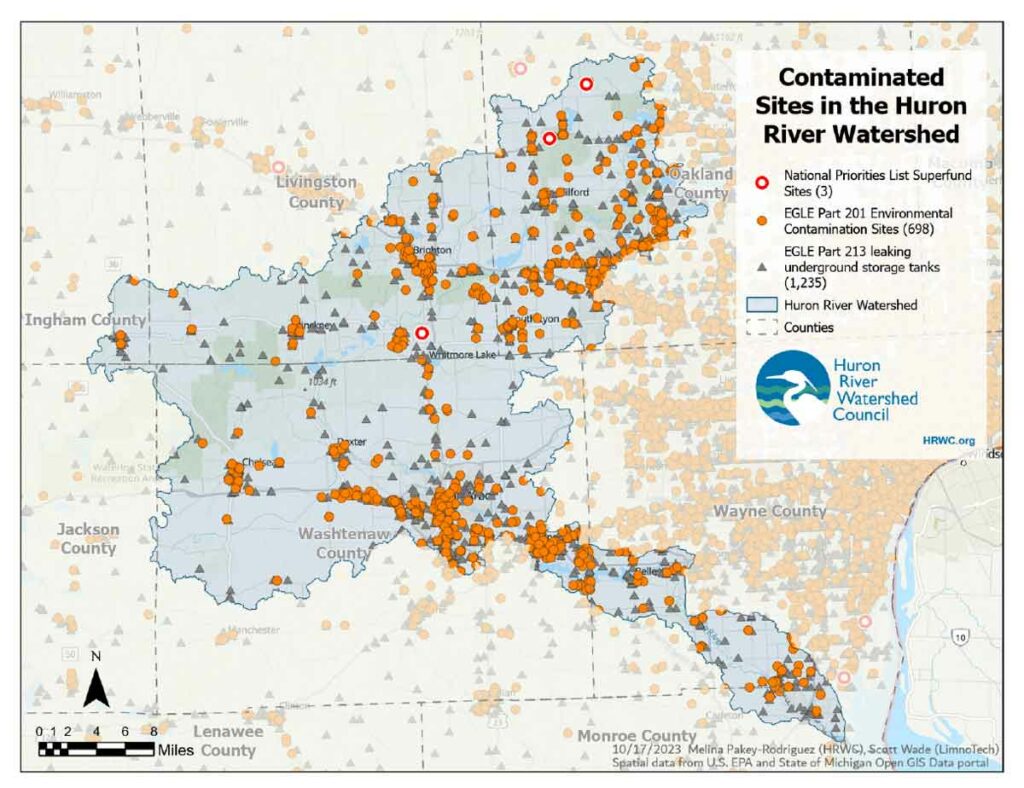On Wednesday, October 25, 2023, State Senator Jeff Irwin, State Representative Jason Morgan, State Senator Sue Shink, and five other Michigan legislators unveiled a seven-bill legislative package that would hold polluters accountable in the State of Michigan. The bills would increase transparency for contaminated site cleanup and put in place accountability measures so corporations that pollute our land and water are responsible for paying to clean it up, not taxpayers.

HRWC participated in a press conference at the Michigan State Capitol along with other environmental organizations, legislators, and advocates highlighting our support for the legislative package. For background information, in 1995, the Michigan Legislature drastically gutted the state’s environmental laws, taking us from one of the most stringent to one of the most lenient states in the United States. This legislative package hopes to restore Michigan to an environmental leader on polluter accountability.
 According to Bridge Magazine, there are over 24,000 known polluted sites in Michigan. In the Huron River watershed, based on data we obtained from the Michigan Department of Environment, Great Lakes and Energy (EGLE) (see our map of contaminated sites in the Huron River Watershed), there are:
According to Bridge Magazine, there are over 24,000 known polluted sites in Michigan. In the Huron River watershed, based on data we obtained from the Michigan Department of Environment, Great Lakes and Energy (EGLE) (see our map of contaminated sites in the Huron River Watershed), there are:
- Three (3) National Priorities List (Superfund) Sites
- Six hundred and ninety-eight (698) EGLE Part 201 Environmental Contamination Sites
- One thousand, two hundred and thirty-five (1,235) Leaking Underground Storage Tanks (known as LUST).
The intent of this legislative package is to do the following:
“To improve standards for environmental cleanup, prevent and clean up orphaned sites, promote access to justice for those harmed by pollution, and hold polluters accountable for the costs of cleanup.”
Contaminated sites in the Huron River watershed
As you know, we’ve had two significant environmental issues on the Huron River caused by a company called Tribar Technologies in Wixom, Michigan. Tribar discharged “forever chemicals” known as PFOA and PFOS to the Huron River through the local wastewater treatment system. In 2018, PFAS contamination was found throughout the Huron River’s five-county area.
In 2022, Tribar, once again, released an extremely toxic chemical called hexavalent chromium into the Wixom wastewater treatment system. This chemical is toxic when inhaled or touched and certainly poisonous if consumed. Fortunately, it was contained at the treatment plant before the effluent was released into the Huron River. EGLE put in place regulatory controls to prevent this from happening again. HRWC continues to monitor this situation.
Additionally, the City of Ann Arbor, Scio Township, and Washtenaw County have been dealing with the Gelman Sciences 1,4-dioxane plume that has directly impacted residents of those communities. The dioxane plume stems from years of unregulated waste handling at Gelman’s facilities. The plume has spread through western Ann Arbor and Scio Township and is approaching Ann Arbor Township and the Huron River at Barton Pond. The City of Ann Arbor draws 85% of its drinking water from Barton Pond.
We are hopeful that committee hearings will be scheduled in the coming months to take testimony on this bill package and that the bills will be reported out and passed to finally hold polluters accountable for the actions they have taken to pollute our natural environment.
HRWC has begun scheduling meetings with the State Representatives (22) and State Senators (7) whose legislative districts cover portions of the Huron River watershed to ask them to support this bill package.
Polluter accountability bills package
Here are the list of bills and links so you can read them directly:
Senate Bill 605: Environmental protection: cleanups; cleanup standards; require.
Senate Bill 606: Environmental protection: cleanups; cleanup to residential and safe drinking water standards; require unless technically infeasible.
Senate Bill 607: Administrative procedure: rules; definition of a rule; exclude cleanup criteria and target detection limits.
Senate Bill 608: Environmental protection: pollution prevention; financial assurance for any facility required to file a pollution incident prevention plan
Senate Bill 609: Environmental protection: groundwater contamination; limitation period for filing actions
Senate Bill 610: Civil procedure: civil actions; action for medical monitoring for individuals exposed to a proven toxic substance
Senate Bill 611: Civil procedure: statute of limitations; accrual of cause of action for groundwater contamination cases
What you can do!
Contact your state representative and senator. Tell them that clean air and water are top priorities. Tell them they should support this package of bills to hold polluters accountable and make them pay for cleaning up their releases of toxic chemicals to our environment.
Find your State Representative
Email me at dlossing@hrwc.org if you live in the watershed and need help finding or contacting your legislator.
Sign a Michigan League of Conservation Voters petition urging our lawmakers in Lansing to support this legislation.
If you are concerned about a contaminated site impacting your private drinking water well, contact your county health department for how to test your well water.
If you have questions about the map, email Daniel Brown, HRWC Watershed Planner at dbrown@hrwc.org.
Sign up for our e-news here and follow us on X (formerly Twitter), Facebook and Instagram. HRWC will track the action on this proposed legislation and share developments with our audiences.



